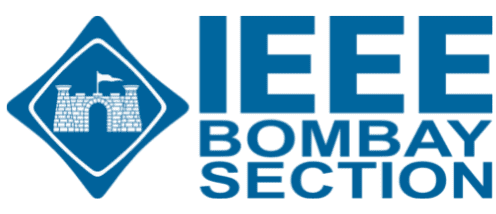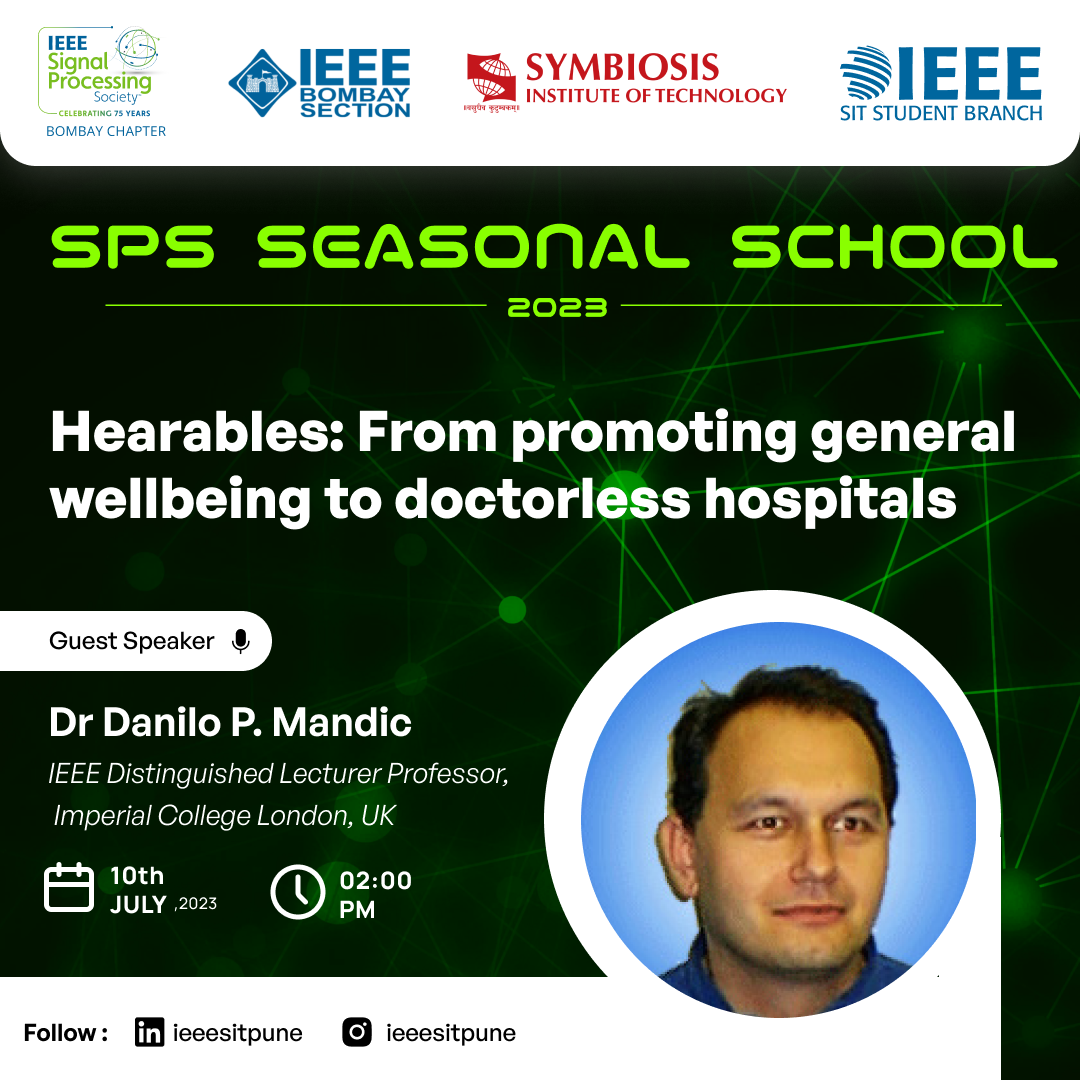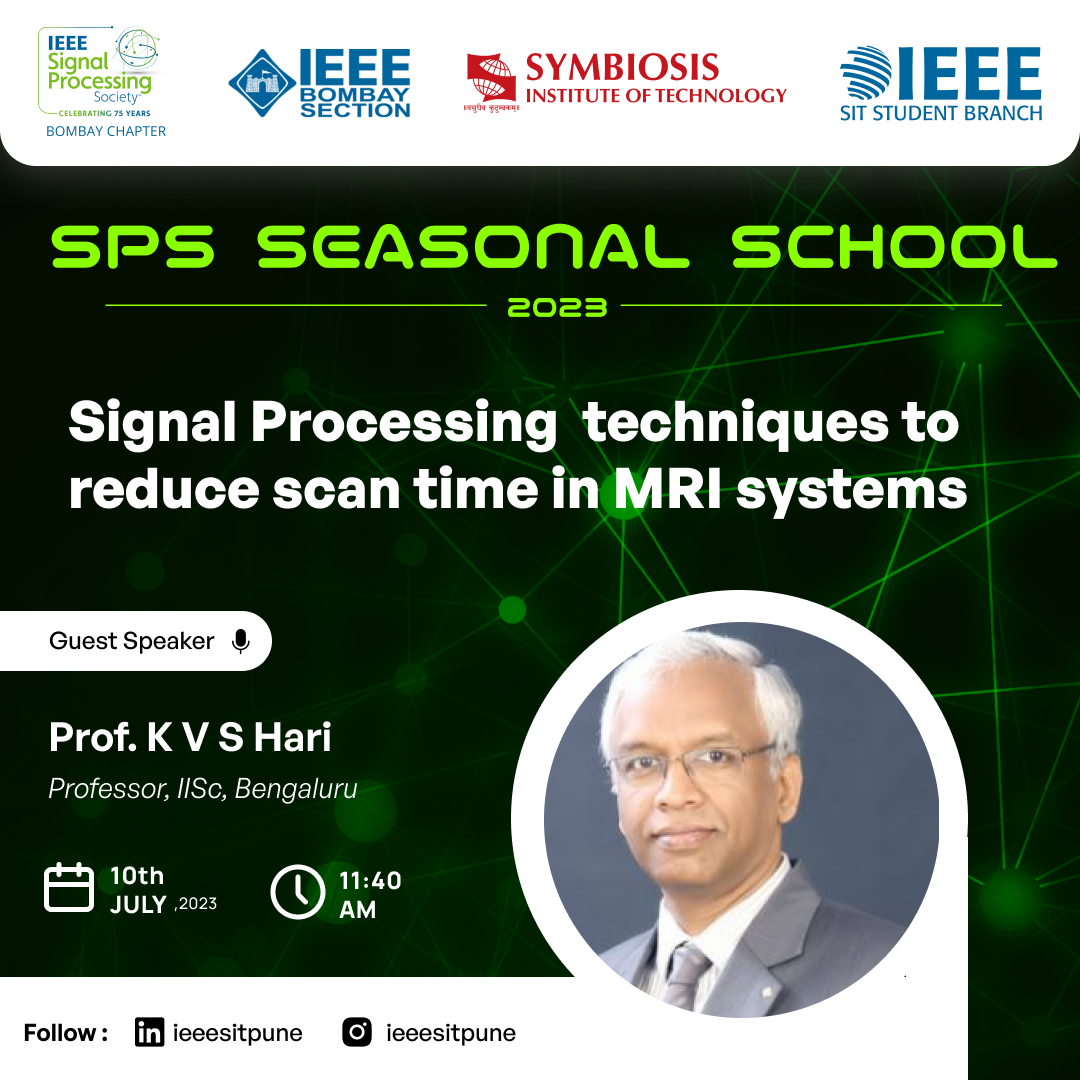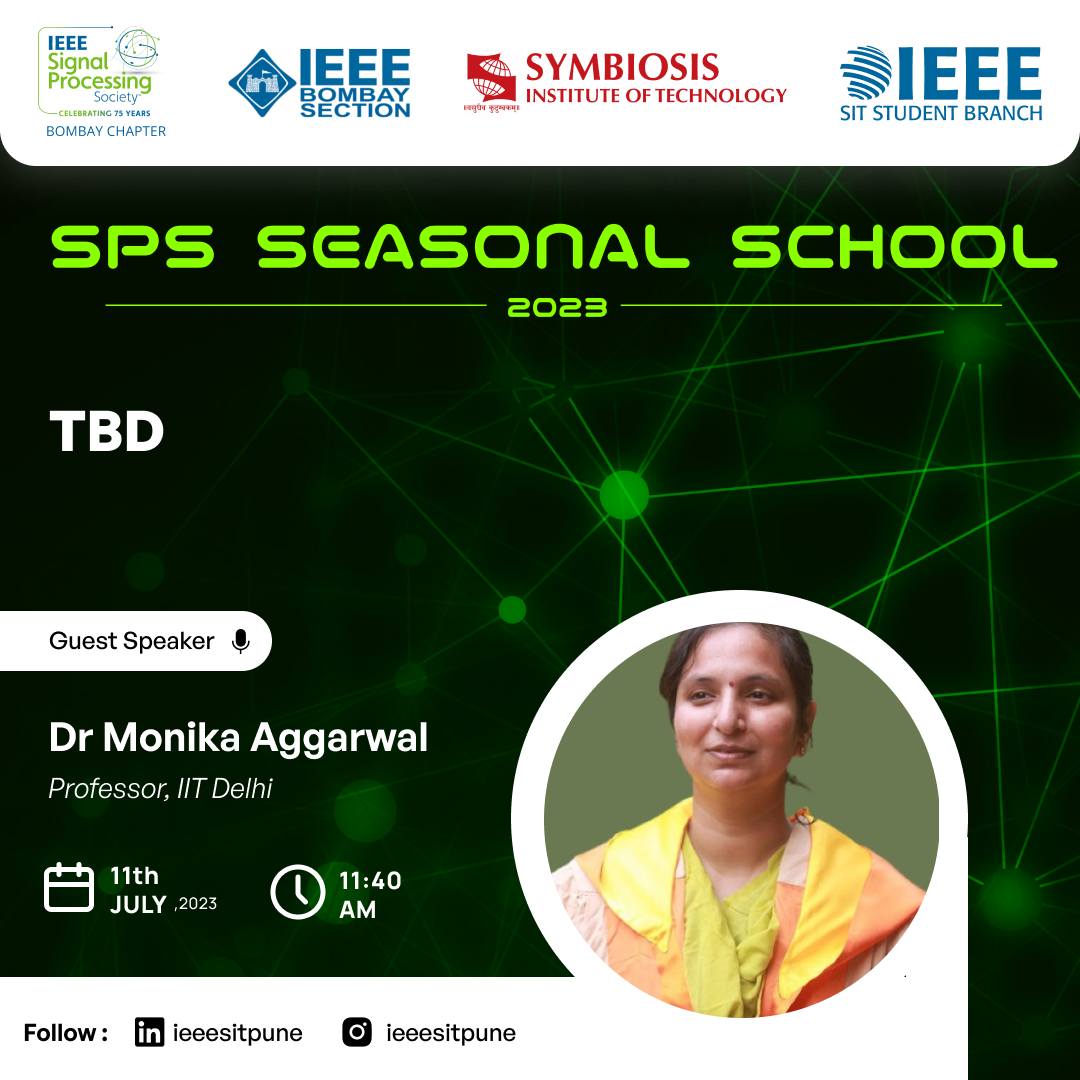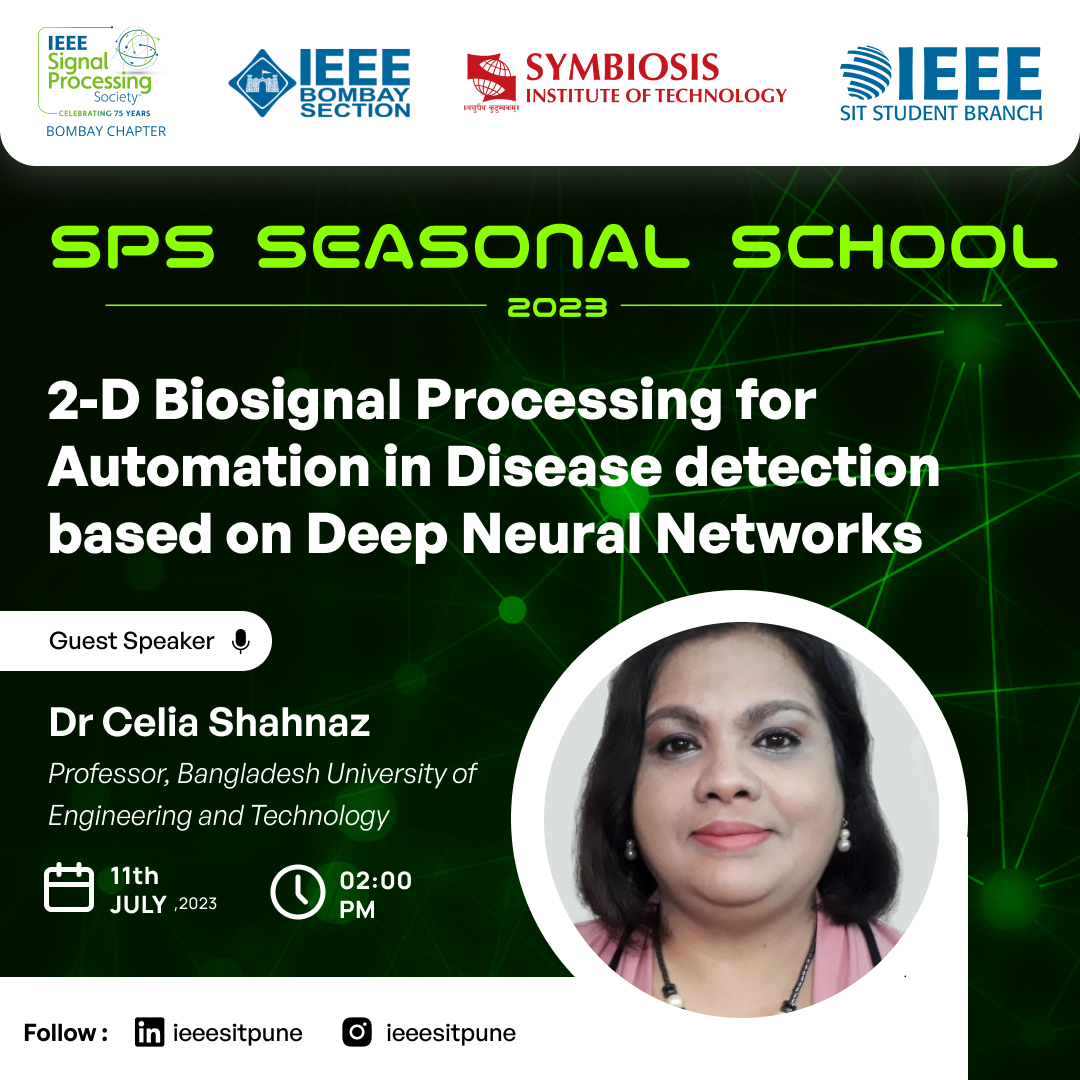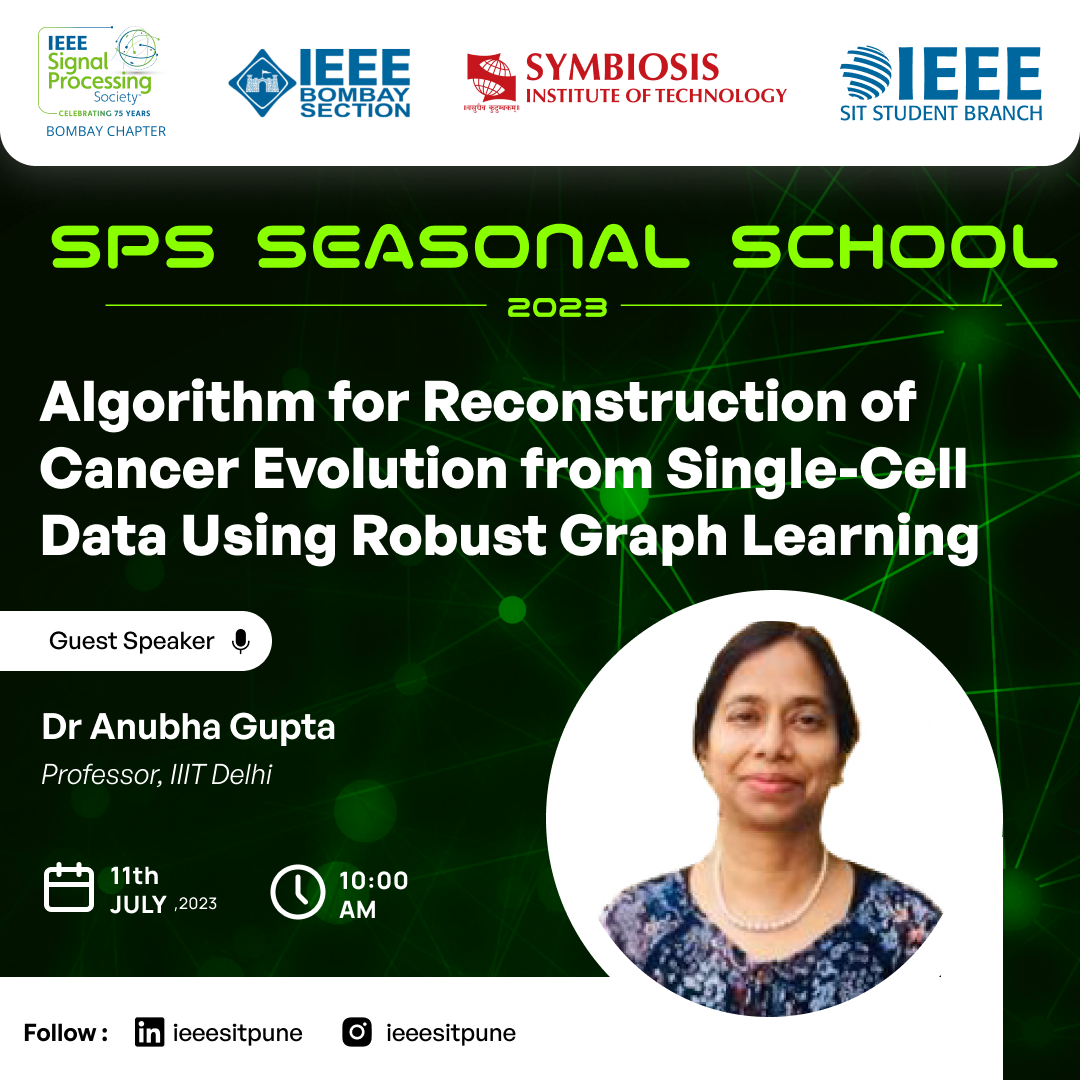About SPS Seasonal School
Signal Processing Society (SPS) of IEEE Bombay Section is excited to announce the upcoming 2023 IEEE SPS Seasonal School on “Signal Processing for Medical and Agriculture Applications” to be hosted by the Symbiosis Institute of Technology, Symbiosis International (Deemed University), Pune during July 10-15, 2023. This School is aimed at providing a comprehensive understanding of the latest advancements in signal processing and their applications to the healthcare and agriculture sectors.
Human activity and motion analysis are essential in various applications, including senior care, robotics, and human-machine communication. It can deliver efficient and quick decision-making. As a result, it has become a substantial source of concern among the active research community. The IoT-enabled technologies provide robust solutions to many real-world technical and scientific challenges combined with signal processing technology. This season school will feature the most recent and exciting developments in signal & image processing applications and time-series data analysis using cutting-edge technologies.
OBJECTIVES
Emerging Solutions
To highlight the potentiality of emerging technologies adoption to provide efficient solutions and quick decision-making in real-time systems.
Redefining Roles
Importance of emerging technologies in redefining the roles of clinicians and farmers.
Enhance Experience
Integration of IoT-enabled technologies to enhance the user experience.
TOPICS
The school will cover a wide range of topics, including deep learning, statistical signal processing, adaptive filtering, signal processing for computer vision, speech processing, and more. It will feature a mix of lectures, hands-on tutorials, and discussions by leading researchers and industry experts. It is open to all students, faculties, industry professionals, and researchers.
Signal Processing and Networking for Big Data Applications
IMPORTANT DATES
10th May 2023
Registration Open
09th July 2023
Registration Closes
09th July 2023
Confirmation Notification
10th - 15th July 2023
REGISTRATION
The registration fee (which covers access to all the lectures, tutorials, and discussions, as well as refreshments and lunch) for various categories is given below:
Indian Nationals
1. IEEE Student Members: Rs. 1200 (+18% GST) ($19)
2. Non-IEEE Student Members: Rs. 1700 (+18% GST) ($25)
3. IEEE Faculty Members: Rs. 1700 (+18% GST) ($25)
4. Non- IEEE Faculty Members: Rs. 2200 (+18% GST) ($32)
5. Student Members (Online mode): Rs. 250 (+18% GST) ($3.5)
Foreign Nationals
1. IEEE Student Members: $60
2. Non-IEEE Student Members: $75
3. IEEE Faculty Members: $100
4. Non- IEEE Faculty Members: $125
5. Student Members (Online mode): $4.5
About IEEE Bombay Section
IEEE Bombay Section was formed on July 13, 1976 from the erstwhile India Section, with Mr. T.V. Balan as its first Chairperson. The geographical territory of the Section includes the states of Maharashtra (excluding Pune City), Goa and UT of Diu and Daman. The Bombay Section gave birth to three Sections – Gujarat (1999), Pune (2010) and Madhya Pradesh (2021). Nagpur in Maharashtra is a sub-section under Bombay Section.
Bombay Section conducted the first ever workshop on Microprocessor and its applications way back in 1977 – hardly anyone in India had heard of the word Microprocessor by then. The International Conference on Systems, Man and Cybernetics of the SMC Society was held in Bombay in 1984. This was the first IEEE Conference held in India. Bombay Section hosted TENCON, the premier annual international technical conference of Region 10 in 1989. Bombay Section hosted the Annual Convention and Exhibition of IEEE India Council in 2000 and 2003. INDICON in 2013 and MTTS’s IMaRC in 2019 are the other notable major conferences. Bombay Section’s Signature Symposia/Conference (IBSS/IBSSC) has been held since 2015.
About SPS
The society’s mission is to foster the development and dissemination of knowledge in signal processing and related disciplines. It aims to promote research, education, and professional growth in signal processing within the Bombay Section.
The IEEE Bombay Section Signal Processing Society plays a crucial role in promoting signal processing as a key discipline within the IEEE Bombay Section, with a strong membership base of 174. Through its activities and initiatives, it aims to create a vibrant community of signal processing professionals, facilitate knowledge sharing, and drive advancements in this field.
About Host Institute
Symbiosis Institute of Technology (SIT) a place where an amalgamation of Science, Technology and Industry can be discerned; with focus on interdisciplinary research and teaching. A constituent of Symbiosis International (Deemed) University with NAAC A++ grade; SIT began its amazing path breaking Edu-tech journey in 2008 with five branches of Engineering: Electronics and Telecommunication, Mechanical, Computer Science, IT and Civil Engineering to empower budding engineering students at future technological development coupled with holistic vision. To keep pace with the changing times, in 2020-21, SIT offered two more specializations for its four-year B.Tech programme: Artificial Intelligence & Machine Learning and Robotics and Automation.
SIT initiated M.Tech in 2011-12. M.Tech programmes in Artificial Intelligence & Machine Learning, Robotics & Automation, Embedded Systems, Geoinformatics & Surveying Technology (G&ST) were designed and offered to students to equip them with the right skills required for the industry 4.0 in 2020 & 2021 and upgrade their knowledge pool.
SIT has successfully bridged the industry academia gap by providing students with hands-on core knowledge with research projects and internships via collaboration with varied organizations. The curriculum is designed & developed in consultation with industry personnel with a blend of Flexi courses, experiential learning, projects, and assignments. Ph. D. research programmes in all the disciplines were also introduced in Faculty of Engineering in 2010.
CONTACT US
Address
Symbiosis Institute of Technology
